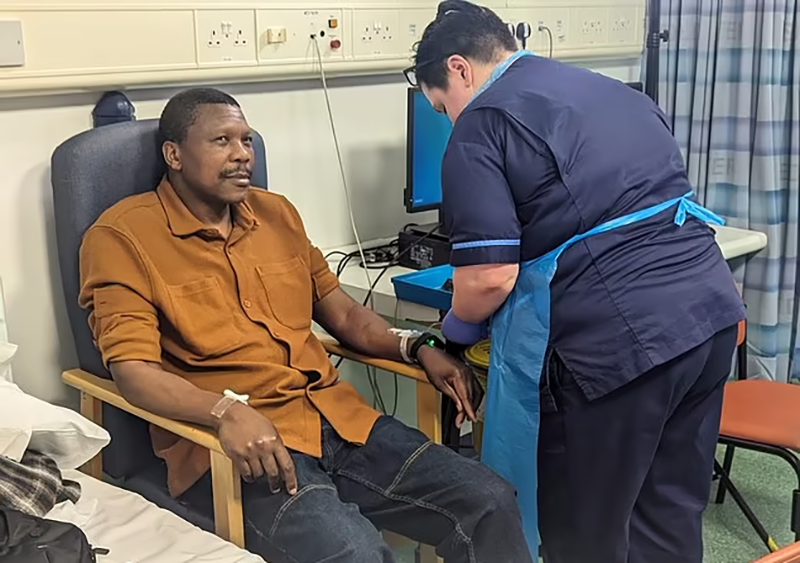- Diaspora
- No Comment
UK: Zim-born lecturer and politician becomes first patient to trial ‘landmark’ cancer care

By UK Media
UNITED KINGDOM: Thousands of National Health Service (NHS) patients in England are expected to get access to trials of a new type of treatment using vaccines to fight their disease in what has been hailed a ‘landmark moment’ for cancer care.
Zimbabwe-born lecturer and politician Elliot Pfebve, a 55-year-old father of four, became the first patient to receive a bowel cancer vaccine on the NHS, getting his first dose at University Hospitals Birmingham in March.
NHS England Chief executive Amanda Pritchard said the health service was in a ‘unique position to deliver this kind of world-leading research at size and scale.’
She said: “Seeing Elliot receive his first treatment as part of the Cancer Vaccine Launch Pad is a landmark moment for patients and the health service as we seek to develop better and more effective ways to stop this disease.”
Thirty hospitals so far have signed up to the Cancer Vaccine Launch Pad. It is designed to match patients with forthcoming trials using mRNA technology, as found in current Covid jabs.
The vaccines are designed to prime the immune system to recognise and destroy any remaining cancer cells and reduce the risk of the disease recurring.
Pfebve, who has already had surgery and chemotherapy, received the jab at Birmingham’s Queen Elizabeth Hospital.
“I feel excited. I did some research about the treatment trial. If successful then it is a medical breakthrough,” he said.

He added: “It may help thousands, if not millions of people, so they can have hope, and may not experience all I have gone through.”
After his initial treatment, tests showed that he still had fragments of cancerous DNA in his bloodstream, which puts patients at increased risk of their cancer coming back.
So he signed up to a trial, external of an investigational vaccine co-developed by pharma companies BioNTech and Genentech, which uses the same mRNA technology as in the Pfizer-BioNTech Covid vaccine.
A sample of Elliot’s tumour was sent to BioNTech’s labs in Germany where up to 20 mutations specific to his cancer were identified.
Using this information, a vaccine was created using mRNA, which contains instructions to Elliot’s cells to produce mutated rogue proteins unique to his cancer cells.
The vaccine acts like a ‘wanted poster’ which unmasks cancer cells which are adept at hiding in the body, only to resurface later.
The intention is that the vaccine will prime his immune system to seek out and destroy any remaining traces of cancer, and so improve the chances of him being cancer free in years to come.

Dr Victoria Kunene, trial principal investigator from Queen Elizabeth Hospital Birmingham, told the BBC: “I think this is a new era. The science behind this makes sense.
“My hope is this will become the standard of care. It makes sense that we can have something that can help patients reduce their risk of cancer recurrence.”
But it is still early days, and while there is great optimism about the potential for mRNA cancer treatment vaccines, they remain in the experimental stage and are only available as part of clinical trials.
More than 200 patients in the UK, USA, Germany, Belgium, Spain and Sweden will be recruited to the trial and will receive up to 15 doses of the personalised vaccine.
Pfebve was one of the founding members of the Movement for Democratic Change (MDC) and the party’s parliamentary Bindura North candidate in the 2001 elections. He however fled to the UK over what he called the “reign of terror” in his constituency.
A lecturer at Coventry University, Pfebve represented the MDC in the diaspora, becoming the party’s envoy to the EU from 2013 to 2022 when CCC was formed.
He is also a member of the Labour party in the UK which he has represented as a councillor candidate in Walsall local elections since 2021.
